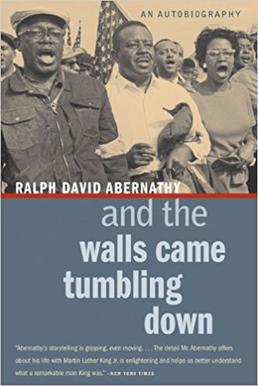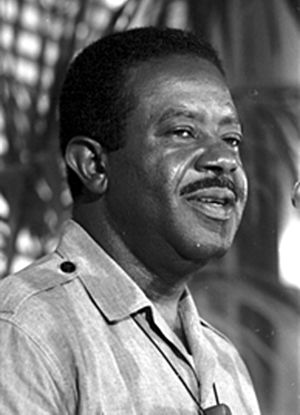And the Walls Came Tumbling Down facts for kids

2010 edition book cover
|
|
| Author | Ralph David Abernathy |
|---|---|
| Country | United States |
| Language | English |
| Subject | Abernathy's participation in the Civil Rights Movement |
| Genre | Autobiography |
| Publisher | Harper and Row, HarperCollins |
|
Publication date
|
1989 |
| Media type | |
| Pages | 672 |
| ISBN | 978-0060161927 |
And the Walls Came Tumbling Down is an exciting book from 1989. It's an autobiography, which means it's a true story written by the person it's about. This book was written by Ralph David Abernathy, a very important leader in the Civil Rights Movement.
In his book, Abernathy shares his life story. He talks a lot about his close friendship and work with Dr. Martin Luther King Jr.. Together, they led the Civil Rights Movement. Their goal was to help African Americans gain equal rights in the United States.
Contents
The Story of a Friendship
Ralph Abernathy was a key leader in the Civil Rights Movement. He worked closely with Martin Luther King Jr.. They first met in 1954 and quickly became best friends. Abernathy and King worked together on many peaceful movements. These movements aimed to bring about fair treatment for all people.
How They Started Working Together
One of their first big projects was creating the Montgomery Improvement Association. This group helped organize the famous Montgomery Bus Boycott. This boycott was a major step in the fight for civil rights. King and Abernathy led many other important movements. They worked in cities like Albany, Georgia, Birmingham, Alabama, and Selma, Alabama. They also led efforts in Washington, D.C. and Chicago.
A Strong Partnership
King and Abernathy had a very strong bond. They often shared hotel rooms while traveling for their work. They also spent free time with their families and friends. They would often eat dinner together. Their children even called each other "Uncle." This shows how close their families were. They were arrested 17 times together for their peaceful protests.
After King's death, Abernathy continued their important work. He took over the Southern Christian Leadership Conference. He kept leading movements they had planned. He also started new efforts against unfair rules. Many people say his book tells King's story as much as his own. This is because their lives were so connected.
As I listened to Ralph Abernathy and his eloquent and generous introduction and then thought about myself, I wondered who he was talking about. It's always good to have your closest friend and associate to say something good about you, and Ralph Abernathy is the best friend that I have in the world. — Dr. Martin Luther King Jr., during his last speech ever delivered I've Been to the Mountaintop
What the Book Is About
In his book, Abernathy shares many details about his close friendship with King. He starts by talking about his part in the Montgomery Bus Boycott. He writes that he was surprised when King was chosen to lead the Montgomery Improvement Association (MIA). But he wished he had nominated King himself.
Leading the Movement Together
Abernathy explains how he was chosen as the program organizer. This meant he was in charge of planning many activities for the group. He says this partnership worked very well. It allowed them to share most of the responsibilities for the MIA.
Abernathy emphasizes their very close relationship in the book. He says they "tried to meet for dinner every day" during the Montgomery boycott. The book shows how their lives were always connected. It tells how King found Abernathy at a church in Atlanta. From that moment, they became best friends and partners in activism.
The "Gold Dust Twins"
Abernathy and King became very well-known wherever they went. Abernathy describes how women would bring them food. This was their way of thanking them for their hard work in the community. The two friends often shared the same jail cell during their many arrests. They were so close that Bull Connor, a police official in Birmingham, Alabama, called them the "Gold Dust Twins." He even demanded they be put in separate cells. He said, "These two have never been separate..."
It was during this time apart that King wrote his famous Letter from Birmingham Jail. This letter was written on April 16, 1963. It explained why they were protesting for civil rights. Abernathy also mentions that King sometimes faced health challenges during their demanding work.
See also
 | Frances Mary Albrier |
 | Whitney Young |
 | Muhammad Ali |


